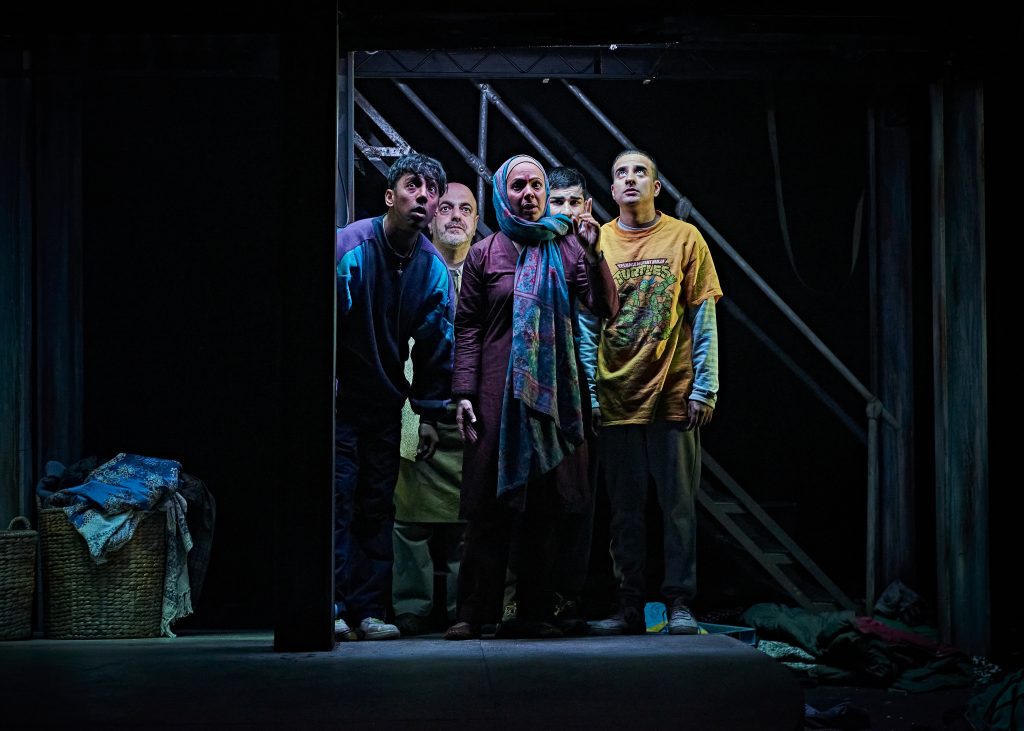Marine Furet reviews The Boy with Two Hearts, the Wales Millenium Centre’s latest production.
You can read an interview of the author of the memoir the play is based on here.
At a particularly tense juncture in his family’s journey to reach the UK, Hessam Amiri (Shamail Ali) stops to consider the role of luck in a refugee’s fate: ‘One bit of luck, he ponders, makes all the difference.’
It takes a singular strength of character to give luck even the benefit of the doubt after being forced to run away from your country by the Taliban. Yet Hessam does.
Before becoming a play, The Boy with Two Hearts, the Wales Millennium Centre’s new production, was a book written by Hamed Amiri, Hessam’s brother. It is based on their own story, which started in 2000 after their mother Fariba (played by Géhane Strehler) was struck with a death warrant by the Taliban for giving a speech championing women’s rights. As a result, the whole family was sent on the road: three sons, Hamed, Hessam, Hussein (Ahmad Sakhi), and their parents Fariba and Mohammed (Dana Haqjoo). The eldest son, Hussein, suffers from a heart condition that requires complex surgery, making the journey a matter of life or death on more than one account. The Boy with Two Hearts, adapted by Phil Porter, is first and foremost a testament to exceptional courage born in the hardest circumstances. On stage, it also makes for a creative and moving production.
The scene is first set in Herat, Afghanistan, in 2000 —before the Twin Towers and an even longer time before the fall of Kabul. Postponed by Covid, the play has now taken on eerily contemporary echoes, but its ability to speak to the moment with clarity and urgency does not hamper its success as a timelessly entertaining performance.
The first half of the play, directed at pace, follows the Amiri from Afghanistan to the UK, helped along with vigorous movement direction by Jess Williams. The second half deals with their life in a new country at a slightly slower tempo. Director Amit Sharma keeps a lightness of touch throughout, which allows the play to drive home even its most emotional points with a welcome touch of humour. This reviewer, for one, cried a number of times.
Syniadau uchelgeisiol, awdurdodol a mentrus.
Ymunwch â ni i gyfrannu at wneud Cymru gwell.
The five-plus-one ensemble cast do a superb job, bringing buckets of energy to the production throughout. The brothers’ banter and games exude a great sense of chemistry and tenderness, as the youngest two look after their eldest, Hussein, who struggles with his increasingly ailing heart. The apparitions of Afghan singer Elaha Soroor punctuate his breathing difficulties and near-cardiac failures. Poised on the edge of the stage, her presence brings a sense of fatefulness to the Amiris’ journey, as she observes them from a distance and gets closer when Hussein struggles to breathe.
‘It is luck that some people get to the UK, when some don’t. That some never have to face a war, when some see it on the daily. That some end up in the Calais Jungle, or in the infamous camp of Sangatte, now closed down, when others can get through the relentlessly unforgiving hoops of the hostile environment in France or in the UK.’
The set, designed by Hayley Grindle, is a semi-circle, which initially stands for the family home before turning itself into a variety of increasingly dangerous and baffling settings. Combined with video work by Hayley Egan, it manages to square the circle of doing justice to the Amiris’ journey from the truck of a car to a ship through typography alone – a laudable feat of inventiveness, if not one that can easily be described in the space of a review. The cast occasionally shifts between characters, becoming strangers met on the road, friends, and handlers. If seeing them out of character can produce occasionally jarring effects, the device illustrates the precarity of a journey in which strangers can unexpectedly become foes or allies.
I started by praising the Amiri’s ability to appreciate their luck in the face of circumstances few of us can begin to imagine, let alone relate to. Yet it is luck that some people get to the UK, when some don’t. That some never have to face a war, when some see it on the daily. That some end up in the Calais Jungle, or in the infamous camp of Sangatte, now closed down, when others can get through the relentlessly unforgiving hoops of the hostile environment in France or in the UK. When one of the Amiri (the father, maybe) mentions his fear of ending up in Sangatte while at a border stop in Austria, an agent reassures him: it’s Austria, here, not France. That my own country should be such a spectacular example of the failure to treat refugees humanely is a topic of great shame and one that should perhaps bring policymakers to think: what should we do so that our country never has to become synonymous with a humanitarian disaster? The Boy with Two Hearts is an emotional piece of theatre and an entertaining night out, but it is also a call to action.
The Boy with Two Hearts by Hamed and Hessam Amiri is at the Weston Theatre, Wales Millennium Centre between 2 and 23 October 2021.
All articles published on the welsh agenda are subject to IWA’s disclaimer.




